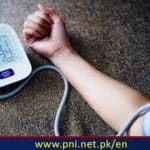ISLAMABAD, JUNE 12 (ONLINE): Researchers report that vigorous physical activity accounts for only 4% of adults waking time while sedentary behavior accounts for 60%.
They say that even light physical activity can increase the odds of healthy aging.
They add that adequate sleep can also improve aging and longevity.
Getting enough sleep and doing moderate-to-vigorous exercise can help with healthy aging, according to a studyTrusted Source published today in the journal JAMA Network Open.
The study’s recommendations may sound like common sense, but the research adds more weight to the idea that a combination of movement and good sleep, even into later years, helps make for a longer, healthier life.
The study authors said more vigorous physical activity is associated with increased odds of healthy aging.
They added that sleep duration has an inverted U-shaped association with healthy aging, with seven hours of daily sleep associated with the highest odds of healthy aging.
However, they caution that in modern society, vigorous physical activity accounts for only about 4% of adults’ waking time whereas sedentary behavior occupies approximately 60% of adults’ waking time and has significantly increased over time.
Details on study of aging, exercise, sleep
The cohort study looked at 45,176 females from the ongoing Nurses Health Study, which started in 1976 and is funded by the National Institutes of Health.
The study examined nurses 50 years and older who didn’t have major chronic disease in 1992. Scientists followed up with them for 20 years. The data was analyzed from January to May 2022.
The scientists defined healthy aging as living to at least 70 while maintaining four health domains (mental health, physical function, no major chronic diseases, and no impairment in subjective memory).
The researchers used an isotemporal (in the same time frame) substitution model to evaluate the potential impact on healthy aging by replacing one hour of one behavior with the equivalent duration of another.
The mean age of subjects was 59 years, with a range of 50 to 72 years.
After 20 years of follow-up, 3,873 women (8%) achieved healthy aging. By age 50, that baseline number was 18%; At 55 it was 9%. At 60 it was 4%. And by 65 years old, it less than 1%.
The study found sedentary behavior was associated with reduced odds of healthy aging, but light physical activity increased the odds of healthy aging.
Television watching and healthy aging
Researchers reported that the study subjects who replaced time spent watching television with light physical activity as well as those who did moderate to vigorous physical activity or got at least seven hours of sleep were all associated with better odds of healthy aging.
The researchers concluded that sedentary behaviors – especially prolonged television watching – were associated with decreased odds of healthy aging.
In comparison, light physical activity was associated with significantly increased odds of healthy aging and moderate to vigorous physical activity was associated with even higher odds of achieving healthy aging.
“These findings complement previous evidence on the association between these behaviors and mortality and provide important evidence for promoting active lifestyles for achieving optimal health at older ages,” the study authors wrote.
Aging as a public health issue
Researchers pointed out that aging is an important public health issue.
In fact, about 10% of the world’s population is more than 65 years old. That number is expected to hit 16% by 2050.
The study authors said aging is usually accompanied by adverse health conditions, including cognitive decline, chronic diseases, psychological disorders, and limitations in physical function.
They said the effects of aging causes “a huge burden on individuals, families, and society” and “approaches to achieve healthy aging, typically defined as being disease-free and physically, mentally, and cognitively healthy are urgently needed.”
The authors noted only 10% to 35% of older adults achieve healthy aging and identifying modifiable behaviors can help increase that percentage.
How to age in a healthy manner
Ryan Glatt, CPT, a senior brain health coach and director of the FitBrain Program at Pacific Neuroscience Institute in California, told Medical News Today the study simply means promoting more movement and less sedentary time, especially for older adults, can improve certain aspects of health and quality of life.
“To improve sleep and start exercising, maintain a regular sleep schedule and a relaxing bedtime routine,” said Glatt, who wasn’t involved in the study. “Ensure your sleep environment is cool, dark, and quiet, and limit screen time before bed.”
“For exercise, try to incorporate aerobic exercise, resistance training, neuromotor exercises, mind-body exercises and/or more physical activity,” he added. “All of these modalities provide both shared and unique health benefits, which may also improve sleep. More relaxing modalities that incorporate breathing and stretching, such as yoga and tai chi, may be helpful prior to sleep.”
Dr. Neil Paulvin is an anti-aging and longevity doctor in New York City. He told Medical News Today that combining enough sleep with the right amount of exercise has numerous benefits.
“Sleep helps aging in many ways, including improved memory, improved heart health, better glucose control, less risk of Alzheimer’s and more,” Paulvin, who wasn’t involved in the study, said. “Exercise, due to the production of myokines, is so important for aging. It helps maintain cognitive health, decreases inflammation, builds muscle important for longevity, improves insulin sensitivity, lowers blood pressure, and much much more.”
Justin Rush is an account coordinator for CenterWell Senior Primary Care in Las Vegas. He told Medical News Today that doctors at CenterWell advise people to stay active, stay connected, eat a healthy diet, and seek professional help for sleep problems.
“Regular exercise is a great way to improve sleep,” said Rush, who wasn’t involved in the study. “Activities that increase your heart rate and oxygen levels release endorphins that can help regulate your sleep patterns and improve your overall mood. Mind-body exercises like yoga and tai chi are also very effective in promoting relaxation and better sleep.”
Rush also said facility doctors advise patients that having strong social ties contribute to better mental health and can help improve sleep quality.
“Whether it’s a phone or Zoom call with a friend or participating in community activities, staying connected with family, friends, and your community can promote a sense of well-being that supports better sleep,” he said.
Follow the PNI Facebook page for the latest news and updates.








